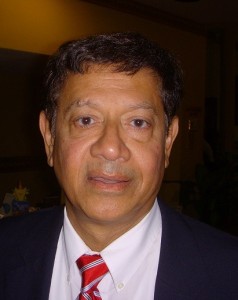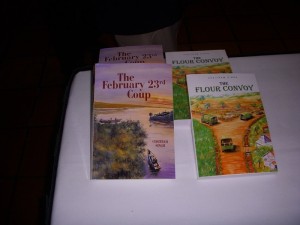
Petamber Persaud shares a review done by Professor Emeritus Birbalsingh who is an anthologist and author of many scholarly publications, including “From Pillar to Post: The Indo Caribbean Diaspora”, “Passion and Exile: Essays in Caribbean Literature”, “The Rise of West Indian Cricket: From Colony to Nation”, and two anthologies of Indo-Caribbean writing “Jahaji” and “Jahaji Bhai”. Birbalsingh is an acknowledged book reviewer.
Chaitram Singh won the 2012 Guyana Prize for Literature (awarded September 2013) in the category of Best First Book of Fiction with his first novel, “The Flour Convoy”. The book under review was shortlisted in the Best Book of Fiction category.
“The February 23rd Coup” is the second novel – after “The Flour Convoy” – by Chaitram Singh, a Guyanese graduate of West Point – an American military academy, and former officer in the Guyana Defence Force. Singh is also author of a non-fiction work, “Politics in Plantation Society”, (1988) and teaches political science at Berry College, Georgia in the U.S.A.
Singh’s second novel focuses on the dictatorial regime of Forbes Burnham which, by the late 1970s had, in the words of one of the novel’s American characters, turned Guyana into, “a refugee encampment for people desperately seeking to flee the punishing conditions of life created by the mismanagement and corruption of a self-perpetuating clique.” (p.246)
While many Guyanese characters express dissatisfaction with the Burnham regime by emigrating, “The February 23rd Coup” highlights an attempted military coup by members of the Guyanese Defence Force on February 23rd 1980. A successful coup would be improbable since it conflicts with historical accuracy, whereas failure of the coup conveys the truth, as expressed by another American official, “suffering would continue, and every low-level official would exact, without impunity, bribes and other favours from people too destitute to pay but too powerless to resist.” (p.246)

Singh’s novel acknowledges the role of the US as one of two super-powers in the second half of the twentieth century when the Caribbean Sea was (and still is) regarded as a privately owned American lake, and territories within or bordering this sea treated largely as the personal effects of Americans.
So it is not surprising that, despite the novel’s fictional coup being planned by Guyanese, every move is monitored, controlled and eventually derailed by the CIA in cahoots with the US embassy in Guyana.
History repeats itself when the CIA Station Chief Colonel Fred Hitchcock reminds the Guyanese president after his brief capture: “Surely you remember from your days in the opposition back in the 60’s that we [Americans] have friends in the [Guyanese] trade union movement. It worked to your advantage back then.” (p.180) Hitchcock also reminds another American Stephen Erikson, assistant military attaché at the US embassy in Guyana that “American interests” were paramount, and in 1980 aimed: “to prevent the spread of communism.” (p.156)
When the action of the novel opens in 1979, Guyana is firmly in the grip of a corrupt government run by the Kabaka Party (alias the People’s National Congress led by Burnham) while the Opposition is the People’s Party (alias the People’s Progressive Party led Dr Cheddi Jagan).
Both parties are socialist, as is a third party, the Workers’ Party (alias the Working People’s Alliance of Walter Rodney) which is led by Dr Nelson, a true Marxist of whom the Americans are most afraid. To the US: “the president was an opportunist whose only concern was to maintain himself in power,” (p.155) while the Opposition leader was toothless because he supported the government ideologically. But Dr. Nelson was a real threat; according to Hitchcock, “we couldn’t have a government under a diehard Marxist like Donald Nelson.” (p. 204).
Thus no one worries later when, like the historical Walter Rodney, Nelson’s car explodes under mysterious circumstances and he is killed.
The coup itself is meticulously planned in strict secrecy by Colonel Ralph Spooner, Capt. Malcolm Felix, Capt. Anthony Cassius McGowan, and Colonel Franchette Taylor. A fifth officer – Capt. Andrew Rambarran – joins only after much persuasion. The author revels in the professionalism of his West Point expertise in presenting this plan, carefully tailored down to the last detail.
The date – Saturday, February 23, 1980 – is carefully selected. It is the day of the official Republic Day parade which will involve servicemen from all three services – the Army, National Service and police. After the parade, the weapons of all servicemen will be deposited in two armouries, except for a group that is controlled by one of the conspirators. Supporters of the coup will be strategically placed, and the whole operation set to begin at 23.00 hours.
This precise planning is executed to perfection and the president arrested; but the coup fails because of unexpected collaboration between the CIA Station Chief Colonel Hitchcock and one conspirator, Capt. McGowan, whose brother Joe Henry is head of the Public Service Union.
After the president’s arrest, Hitchcock virtually orders the president to treat Capt. McGowan’s collaboration in the coup attempt leniently since his betrayal of his fellow plotters restored power to the president. On top of that, leniency would promote good relations with the Public Service Union.
It is almost an exact repeat of 1964 when similar “American interests” were first covertly imposed on Guyana.
Not that “The February 23rd Coup” is anti-American. On the contrary, each chapter opens with a date and place in the form of a diary, for example, “February 23, 1980: Georgetown, Guyana,” accompanied by a style that includes American military idioms, forms of address and speech, and technical discussions of tactics and strategy which give the impression of a professional, (West Point) military briefing.
But this stiff formality is relieved by the warmth of a love story between Andrew Rambarran and Lena, the sister of Colonel Ralph Spooner, and more so by another (more challenging) relationship between Steve Erikson and Anita – Rambarran’s sister.
Yet the real appeal of the novel is in its concluding chapters when Rambarran is imprisoned in Suriname, and is rescued in a series of daring, and exciting, action-packed exploits, both on land and sea, in the style of American Western films where beleaguered but good heroes win against overwhelming odds.
At the end of the novel, these exploits are seen in terms of virtue by Erikson and Rambarran who agree on their sanction by Hindu religious texts, the Ramayana and Mahabharata: “That’s what we stand for, isn’t it? Virtue?” (p.317) But if American interests in preserving the regime of a corrupt Guyanese dictator are virtuous, where do they leave poor, little Guyana, or us poor, Guyanese wretches?
Chaitram Singh, “The February 23rd Coup”; Bloomington, Indiana, iUniverse, Inc. 2011, pp. 338. ISBN: 978-1-4620-2052-2 (e)
Responses to this author telephone (592) 226-0065 or email: oraltradition2002@yahoo.com
What’s happening:
• The Guyana Annual 2012-2013 magazine is now available at Guyenterprise Ltd, at Austin’s bookstore and from the editor at the above contacts. This issue of the magazine is dedicated to E. R. Braithwaite. The magazine also features articles on copyright, law of intellectual property, creative industries, oral traditions of Guyana, the future of West Indian cricket and the future of books.
• Coming soon “Coolie Woman: The Odyssey of Indenture,” by Gaiutra Bahadur
• Now available “Selected Fictions” by Ruel Johnson, winner of the 2012 Guyana Prize for Literature.
• Coming soon: “An Introduction to Guyanese Literature” by Petamber Persaud.



